kombucha health risks

In the effervescent world of fermented beverages, kombucha has emerged as a popular choice for health-conscious individuals seeking a tangy, probiotic punch. While this ancient elixir boasts a myriad of rumored health benefits, what about its lesser-known side? Delving into the depths of kombucha’s potential health risks unveils a shadowy underbelly that warrants exploration. Let’s embark on a journey to uncover the truths, myths, and mysteries surrounding the enigmatic kombucha brew. Step into the realm of kombucha health risks, where clarity awaits amidst the swirling cultures and tang of this intriguing concoction.
Table of Contents
- Common Misconceptions About Kombucha Health Risks
- Potential Health Issues Associated with Kombucha Consumption
- Tips for Safely Enjoying Kombucha
- Consulting a Healthcare Professional Before Adding Kombucha to Your Diet
- Q&A
- The Way Forward
Common Misconceptions About Kombucha Health Risks
Many people believe that kombucha can lead to severe health risks, but it’s essential to separate fact from fiction when it comes to this fermented drink. One common misconception is that kombucha can cause harm due to its naturally occurring alcohol content. However, the alcohol levels in commercially produced kombucha are typically below 0.5%, which is well within the legal limit and considered safe for consumption.
Another myth surrounding kombucha is that it can lead to adverse effects on gut health. In reality, kombucha is known for its probiotic properties, which can actually promote gut health by introducing beneficial bacteria to the digestive system. When consumed in moderation, kombucha can be a refreshing and potentially beneficial addition to a balanced diet.

Potential Health Issues Associated with Kombucha Consumption
When it comes to consuming kombucha, there are certain potential health issues that individuals should be aware of. While kombucha is generally considered safe for most people when consumed in moderation, some individuals may experience adverse effects due to various reasons.
One possible health concern related to kombucha consumption is its acidic nature, which may not be suitable for individuals with sensitive stomachs or acid reflux. Additionally, since kombucha is a fermented beverage, those with compromised immune systems should exercise caution to avoid potential bacterial contamination that could lead to infections.

Tips for Safely Enjoying Kombucha
When it comes to enjoying kombucha, it’s essential to be mindful of a few key things to ensure a safe and pleasant experience. First and foremost, always opt for reputable brands or consider brewing your own kombucha at home. This way, you can have more control over the ingredients and the fermentation process.
- Choose glass over plastic containers for storing and serving kombucha to avoid harmful chemical leaching.
- Refrigerate kombucha to slow down the fermentation process and maintain its freshness.
- Start slow with small servings to allow your body to adjust to the probiotics and acetic acids present in kombucha.
Moreover, always pay attention to any signs of mold, unusual taste, or fizzy texture, as these might indicate spoilage. By following these simple tips, you can savor your kombucha with peace of mind, knowing that you’re prioritizing both your health and enjoyment.
| Tip | Benefits |
|---|---|
| Choose glass over plastic containers | Avoid chemical leaching |
| Refrigerate kombucha | Maintain freshness |
| Start slow with small servings | Gentle introduction to probiotics |

Consulting a Healthcare Professional Before Adding Kombucha to Your Diet
Before incorporating kombucha into your daily routine, it’s crucial to seek advice from a healthcare professional, especially if you have underlying health conditions or are pregnant. Consulting a health expert can help you navigate the potential risks and benefits associated with consuming kombucha.During your consultation, ensure to discuss any medications you are currently taking, as kombucha can interact with certain drugs. Your healthcare provider can provide personalized recommendations based on your unique health status, guiding you on the safe consumption of this trendy fermented beverage. Remember, your health comes first, so always prioritize professional guidance when making changes to your diet.
Q&A
Q: Is drinking kombucha safe for everyone?A: While kombucha is generally considered safe for most people, individuals with weakened immune systems or certain health conditions should consult with a healthcare provider before consuming it.
Q: Can kombucha cause any adverse effects?
A: In some cases, excess consumption of kombucha may lead to digestive issues, allergic reactions, or even alcohol-related problems due to fermentation. Moderation is key to avoiding such risks.
Q: Are there any concerns about kombucha’s potential impact on pregnant women?
A: Pregnant women should exercise caution when consuming kombucha due to its probiotic and caffeine content. It’s advisable to seek guidance from a healthcare professional to assess any potential risks.
Q: How can one reduce the risk of adverse effects when drinking kombucha?
A: To minimize health risks associated with kombucha consumption, opt for reputable brands, avoid homemade versions with uncertain fermenting processes, and adhere to recommended serving sizes.
Q: What should someone do if they experience negative symptoms after drinking kombucha?
A: If you encounter any unfavorable reactions such as nausea, vomiting, or allergic responses post-consuming kombucha, it’s advisable to discontinue use and seek medical advice promptly.




0 Comments